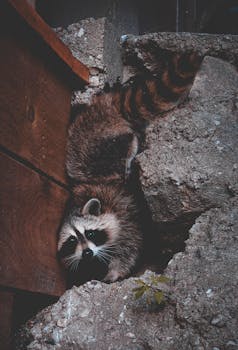How to Take Care of Raccoons
Contents
Taking care of raccoons can be a rewarding experience. Raccoons are intelligent, curious, and playful animals that can make great pets. With proper care and attention, raccoons can be healthy and happy companions. In this article, we’ll cover the basics of raccoon care, including diet, housing, and health. We’ll also provide tips on how to keep your raccoon safe and healthy.
Overview of Raccoon Care
Raccoons are wild animals, and they require special care to ensure their health and safety. Raccoons need a safe, secure, and comfortable environment in order to thrive. They also need a balanced diet that includes a variety of foods. It’s important to provide your raccoon with plenty of enrichment activities to keep them mentally and physically stimulated. Lastly, regular veterinary checkups are essential for maintaining your raccoon’s health.
Diet
Raccoons are omnivores, so they need a balanced diet that includes both plant and animal matter. A good diet for a raccoon should include a variety of fruits, vegetables, and proteins. Raccoons also need access to clean, fresh water at all times. It’s important to provide your raccoon with a variety of foods to ensure they get all the nutrients they need.
Housing
Raccoons need a safe and secure environment to live in. The ideal raccoon habitat should be large enough for the raccoon to move around freely. It should also be outfitted with plenty of hiding places and enrichment activities. Raccoons should also have access to a warm, dry place to sleep.
Health
Regular veterinary checkups are essential for maintaining your raccoon’s health. Raccoons are susceptible to a variety of diseases and parasites, so it’s important to keep up with vaccinations and deworming. It’s also important to monitor your raccoon for any signs of illness or injury.
Safety
Raccoons can be curious and adventurous, so it’s important to keep them safe. Make sure your raccoon’s habitat is secure and escape-proof. Also, keep your raccoon away from potential hazards such as roads, power lines, and other animals.
Enrichment
Raccoons need plenty of enrichment activities to keep them mentally and physically stimulated. Provide your raccoon with toys, puzzles, and other activities to keep them entertained. Raccoons also need access to the outdoors, so make sure they have a safe place to explore.
Pro Tip
Raccoons are social animals, so it’s best to keep them in pairs or small groups. This will help them stay healthy and happy.
Frequently Asked Questions
- What do raccoons eat?
- Raccoons are omnivores, so they need a balanced diet that includes a variety of fruits, vegetables, and proteins.
- How big should a raccoon habitat be?
- The ideal raccoon habitat should be large enough for the raccoon to move around freely.
- How often should I take my raccoon to the vet?
- Regular veterinary checkups are essential for maintaining your raccoon’s health. It’s best to take your raccoon to the vet at least once a year.
In conclusion, taking care of raccoons can be a rewarding experience. Raccoons need a safe, secure, and comfortable environment in order to thrive. They also need a balanced diet that includes a variety of foods. It’s important to provide your raccoon with plenty of enrichment activities to keep them mentally and physically stimulated. Lastly, regular veterinary checkups are essential for maintaining your raccoon’s health. With proper care and attention, raccoons can be healthy and happy companions.

















